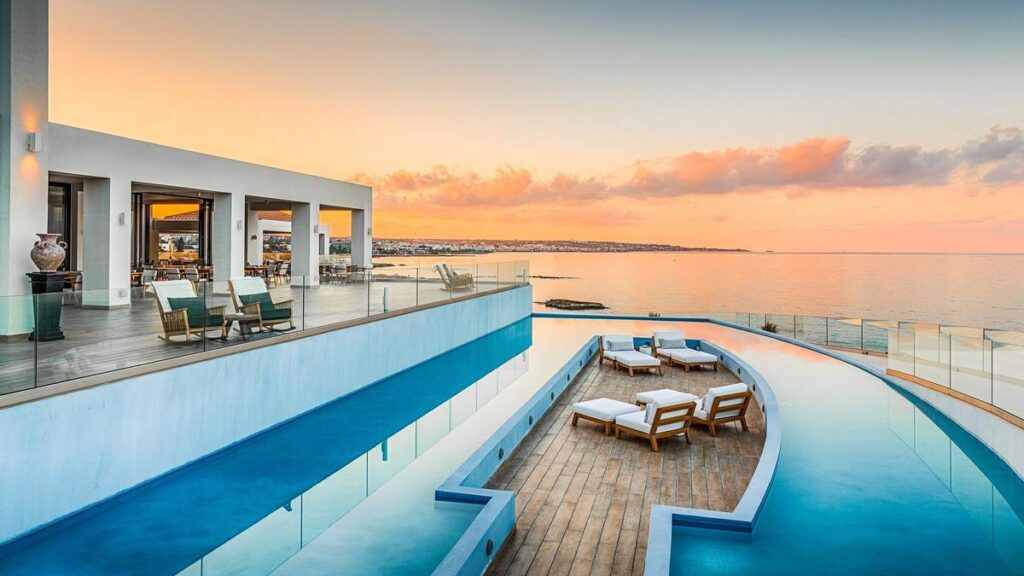
The landscape of Greece’s hospitality industry is undergoing significant transformation as luxury hotels increasingly dominate the market, posing challenges for traditional family-run establishments. In recent years, the number of five-star hotels has surged, marking a shift in the tourism sector that many locals struggle to navigate.
Historically, Greece has welcomed tourists with a unique charm, offering intimate stays in family-run accommodations. Georgios Kaloutsakis, whose family opened one of the first hotels in Cretan resort Hersonissos, recalls a time when visitors felt a genuine connection to the local culture. “Greece has always been about experience and emotions,” he stated. Yet, as luxury hotels proliferate, the intimate charm of these family businesses is at risk.
The development of Greece’s luxury hotel industry began in the 1960s, attracting international celebrities like Grace Kelly and Marlon Brando. By the late 1970s, only a handful of five-star hotels existed, including the renowned Grande Bretagne and Astir Palace in Athens. According to Eleni Skarveli, director of the Greek National Tourist Office (GNTO) for the UK and Ireland, luxurious amenities were once limited to the elite.
Today, the landscape has changed dramatically. Kaloutsakis highlights the evolution of accommodations, noting that his property, Abaton Island, features modern amenities like sea-view pools and plush bedding. “The industry has become more corporate and industrial in scale,” he explained. While this has improved efficiency and consistency, it has also diminished the personal touch that characterized earlier hospitality.
On the island of Crete, the Metaxas family celebrates the 50th anniversary of their five-star resort, Creta Maris. Andreas Metaxas, chief executive of Metaxa Hospitality, points out that the transformation of Greek tourism has been remarkable. Between 2012 and 2022, more than 400 five-star hotels opened, an increase of 117 percent from the previous decade. In this period, five-star properties accounted for 43.5 percent of total hotel revenues.
As luxury expectations evolve, Metaxas observes a shift in guests’ demands. “Luxury in hospitality has transitioned from material opulence to meaningful experiences,” he noted. Guests now seek authenticity and simplicity rather than lavish features.
The Chaidemenos family, owners of the prestigious Canaves hotels in Santorini, have been pivotal in this evolution. Markos Chaidemenos emphasizes the importance of balance, as the island faces challenges related to over-tourism. To manage the influx of visitors, Santorini has implemented measures such as capping cruise ship passengers at 8,000 per day and charging a €20 (£17) fee for cruise visitors.
Greece’s charm has attracted increasing numbers of tourists, with arrivals growing from 71,000 in 1930 to approximately 35.9 million annually today. The 2024 Virtuoso Luxe Report identifies Greece as a top global destination for high-spending travelers, further solidifying its status in the luxury market.
During the inauguration of the One&Only Aesthesis, Greece’s second resort under the One&Only brand, Prime Minister Kyriakos Mitsotakis stated that Greece aims to position itself as a leader in the ultra-luxury tourism market. Despite this ambition, traditional family-owned hotels face mounting pressure to compete with international brands.
According to the Institute of Tourism Research and Forecasting, the number of one-star and two-star hotels in Greece has drastically declined. By the end of 2024, one-star hotels are expected to decrease to 1,147, and two-star hotels to 3,251, reflecting a loss of 1,538 hotels in just one year. Kaloutsakis highlights the dire situation for smaller establishments, stating, “Today, survival in our industry is directly tied to growth: it’s a case of ‘get bigger or die’.”
The Travelworks’ Greek market report for 2024 to 2027 predicts that over 60 hotel projects will be developed in the coming years, with a significant portion operated by international brands. “Luxury can be built anywhere in the world, but the soul of Greek hospitality cannot be replicated,” Kaloutsakis concluded, emphasizing the unique warmth and authenticity that define Greece’s tourism industry.
As the competition intensifies, the balance between preserving local hospitality traditions and embracing modern luxury becomes increasingly critical for the future of Greek tourism.






